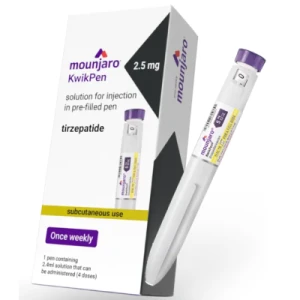Weight loss injections: Foods to avoid while using Mounjaro
To maximise the benefit of Mounjaro on your weight loss journey, it’s important to follow a healthy diet. While each weight loss treatment may require you to eat different foods for the best results, if you’re using Mounjaro, you’ll need to avoid sugary foods, fried foods, refined carbohydrates, fizzy drinks, and alcohol. We’ll look at these foods a little more closely in this article and discuss the foods you should be eating with Mounjaro.
START YOUR MOUNJARO CONSULTATION TODAY
Foods to avoid whilst on Mounjaro
Getting the best out of your weight loss journey means making some simple changes to your diet to support Mounjaro’s effectiveness.
It’s essential to understand which foods to avoid, as certain foods can reduce the effectiveness of Mounjaro and increase the risk of side effects.
Below is an example of the foods you should look to avoid when taking Mounjaro.
Sugary foods
Avoiding sugary foods is essential when using Mounjaro, as well as other weight loss injections such as Wegovy, to maintain stable blood sugar levels and promote weight loss. That means avoiding foods like:
- Cakes
- Biscuits
- Sweets
- Desserts
- Ice cream
- Fruit juices
- Sugary breakfast cereals
- Specialty coffees
- Fizzy drinks such as cola
Fried or processed foods
Fried fatty foods, such as burgers and chips, are among the most difficult to digest and are likely to cause effects like heartburn and stomach cramps.
Fried foods contain more calories than non-fried foods, which can contribute to weight gain. Research also indicates that the trans fats present in fried foods can have an adipogenic effect, promoting the development of fat cells. Many studies have identified a link between the consumption of fried food and the risk of becoming overweight or obese.
You should aim to avoid foods like:
- Chips and French fries
- Fried chicken
- Doughnuts
- Burgers
- Microwave or ready meals
- Savoury snacks, e.g., crisps, sausage rolls, pies
- Pastries
- Processed meats, e.g., ham, sausages, bacon, salami
High GI fruits and vegetables
Although fruits and vegetables are generally considered healthy, some are high in sugar and can cause a rapid spike in blood sugar. These foods have a high glycaemic index (GI) and are best avoided when using Mounjaro.
You should look to avoid:
- Fruit
- Ripe or yellow bananas
- Mango
- Grapes
- Dates
- Pears
- Oranges
- Vegetables
- Potatoes
- Carrots
- Parsnips
- Beetroot
- Sweetcorn
Refined carbohydrates
There are many different types of carbohydrates available, including simple, complex, refined, and whole, but it can be confusing to determine which types you should be eating.
Carbohydrates are a type of macronutrient that the human body uses as an energy source. However, some types of carbohydrates can interfere with how well Mounjaro works. It is advisable to avoid foods like white rice, flour tortillas, white bread, and bagels as these can cause a rapid increase in your blood sugar levels, contribute to obesity, and increase the risk of cardiovascular disease.
Mounjaro
- Approved Weight Loss Treatment
- Suitable for adults with a BMI of +30kg/m²
- Pre-filled injection pen
Alcohol
Drinking alcohol can have a negative impact on your weight loss efforts because it:
- Prevents your body from burning fat
- Is high in calories
- Can increase hunger
- Makes you crave unhealthy foods
If you are going to drink alcohol, it is important to understand how many units your drink contains. The image below shows the average number of units in popular types of alcoholic drinks:

Alcohol can contribute to excess energy intake and weight gain in some people. It’s also responsible for causing a drop in blood sugar levels because your liver stops releasing glucose in favour of processing alcohol.
The UK’s Chief Medical Officer recommends men and women do not exceed 14 units of alcohol per week.
Tirzepatide has also been recommended for type 2 diabetes treatment by the National Institute for Health and Care Excellence, so drinking alcohol alongside taking Mounjaro could cause a sudden and risky drop in blood glucose.
Foods you should eat while using Mounjaro
Just because some foods and drinks are off-limits on Mounjaro doesn’t mean you can’t incorporate many other delicious and nutritious foods into your diet.
While using weight loss injections, such as Mounjaro, it’s essential to focus on consuming nutritious, high-fibre foods that incorporate healthy fats.
Swap fried or processed meat for lean protein:
Lean protein, such as chicken, fish, tofu, and Edamame, should be a staple in your diet and can help support your weight loss journey because it has a lower calorie content. Lean meats and protein sources can help keep you feeling satisfied for longer, helping you to resist the urge to snack.
Swap white bread and rice for whole wheat varieties:
Whole-grain foods, such as brown rice, whole-wheat bread, and quinoa, are great for regulating blood sugar and aiding weight loss because they cause a gradual rise in blood sugar and keep you feeling full. These foods are also packed with fibre, so they can aid healthy digestion and contain many of the essential nutrients the body needs to stay healthy.
Choose leafy green vegetables and low GI fruits:
Although some fruits and vegetables can cause spikes in blood sugar, some can have the opposite effect. Green, leafy vegetables, such as kale, spinach, and broccoli, are excellent examples of complex carbohydrates that release sugar slowly into the bloodstream and help suppress your appetite. If you're looking for a healthy sugar boost, try apples, berries, or green bananas.
Mounjaro
- Approved Weight Loss Treatment
- Suitable for adults with a BMI of +30kg/m²
- Pre-filled injection pen
Stay hydrated:
It’s important to drink plenty of water while using Mounjaro for weight loss, as water contains no calories and can help manage body weight. If you experience any Mounjaro side effects, like those listed in the Mounjaro patient information leaflet, water can help manage some of the symptoms.
Summary
Although there is no strict Mounjaro diet plan to follow, making small changes to your food intake can be an effective strategy for weight loss. It’s essential to opt for high-protein and whole foods over high-sugar and fried options. When using Mounjaro for weight loss, it’s also vital to stay hydrated, especially if you are experiencing any digestive-related side effects, such as nausea, vomiting, or diarrhoea.
If you are unsure and would like any further information, your healthcare team or one of our clinicians can provide advice.
Additional Resources
Sources
- NHS Inform, (2023). Low-risk drinking guidelines
- NICE, (2023). NICE committee recommends tirzepatide as a new treatment option for people with type 2 diabetes.
- The Nutrition Source, (2024). Whole Grains.
- NHS. Good foods to help your digestion
Authored By

Leanne Edermaniger
Medical Content WriterPublished on: 21/05/2024
Reviewed By

Mohamed Imran Lakhi
MPharm - Lead PharmacistReviewed on: 05/06/2025
© 2013 - 2026 Al Muhsineen Limited. All Rights Reserved. Registered Pharmacy: 34 Halliwell Road, Bolton BL1 8RL. Registered Office: 254 First Floor, Shearbrow, Blackburn, England, BB1 8DS






